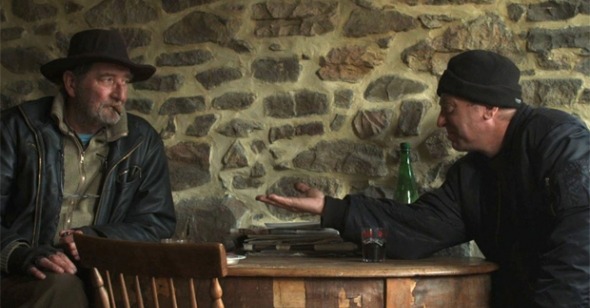Under the Table
by Jeff Reichert
Ne me quitte pas
Dir. Sabine Lubbe Bakker, Niels van Koevorden, Netherlands/Belgium, no distributor
Ne me quitte pas plays at Museum of the Moving Image from November 18 – 27.
How long have Belgian drunks Bob Spaenhoven and Marcel Meijs, the nominal “stars” of the documentary Ne me quitte pas, known each other? According to Marcel, in a moment of inebriated clarity near the film’s end: “Too damn long.” Marcel is the younger of the pair, and over the course of the film, we watch him turn from 52 to 53, lose his wife of 16 years, navigate single parenthood, and attempt rehab for alcoholism. Gray-bearded Bob, usually sporting a beaten fedora and rumpled coat, is often seen caring for his younger, quickly unraveling friend and sagely offering up bon mots like, “If we don’t feel pain, we can’t tell we feel good.” When Marcel responds to this, “I’m going to make it,” it’s unclear that the film believes him, but we feel that with Bob in his court, the younger man has at least a shot.
Ne me quitte pas, filmed in mostly locked-off, tripod-mounted ’scope compositions, observes from a vantage point very close to these two men. We watch them drink and drink and drink some more. We see Marcel floundering—in one early scene, he falls over and passes out, and Bob wakes him with a bucketful of scalding water. Later, Bob collects a soused Marcel from the side of the road and forces him to sniff ammonia to get him closer to sober for his scooter ride home. As if to throw down some kind of gauntlet, the filmmakers introduce us to Marcel in close-up as he’s receiving the news that his wife is leaving him. The majority of scenes take place within Marcel’s home or Bob’s more remote cabin. The camera’s so close that the filmmakers’ intimacy becomes its own kind of spectacle. “How were they there for that?” you’ll wonder. And then when confronted with the documentary evidence of the next step in Marcel’s gradual degradation, you’ll wonder it all over again.
There’s comedy in all of this, too, though the film, seemingly worried you might lose sight of this, provides some helpful underlining at its outset: blocky, bright yellow opening credits punching in and out while breezy pop plays (Jacques Brel’s slower, sadder Ne me quitte pas might have been more apropos) over a hood-mounted frame that captures Bob and Marcel driving through the Flemish forest, buddy-movie style. Inasmuch as you are a person who can find amusement watching the stumbling of the sotted, or locate humor in slurred tippler wisdom, Ne me quitte pas might well be the comedy of the year: a nonfiction (semi-real?) counterpoint American bro comedy—Grumpy Aging Belgians.
Unlike the makers of most American comedies, however, filmmakers Sabine Lubbe Bakker and Niels van Koevorden do seek an essential humanity in their scenario. Marcel’s stint in rehab, especially, is soaked in pathos. A long shot of him wandering the halls of the facility alone strikes at primal terror—he’s separated from his drink, but, more importantly, from Bob. Bakker and Koevorden place Marcel’s troubles at the film’s center, but they capture Bob’s unraveling at the margins, even though the older man generally seems somehow sanguine, above it all. When he takes Marcel to the entrance interview for the treatment program, he proudly attests that he can both drink half a bottle of rum daily and stop cold with nary a tremor. The filmmakers gradually reveal the depth of his denial. It’s perhaps first visible when Bob visits his grown son in town and asks a series of questions that suggest he knows little about the younger man’s life. (His son’s clear skittishness across the table is another tell.) The film’s climax, in which Marcel, well off the wagon again, has to clean up Bob’s vomit with a mop, signals that Bob’s not always the caretaker. Maybe each one in this pair of codependents takes turns allowing the other to be more miserable.
Aesthetically, Ne me quitte pas isn’t a far cry from other recent, collaborative, subject-centered works of nonfiction like Roberto Minervini’s The Other Side or Tony Stone’s Peter and the Farm. Yet unlike those two films, which place their main subjects in the midst of larger investigations (Minervini’s broadening out to an ethnography of American revanchists; Stone’s seasonal pastoral symphony), Bakker and Koevorden stick stubbornly to the trials of Bob and Marcel. The course of their lives determine the course of the film, with the filmmakers intervening gently with simply titled chapter breaks—“Friendship,” “Withdrawal,” “Home Sweet Home.” It’s a credit to the filmmakers’ casting that we don’t much wonder about the world beyond Bob and Marcel. We don’t hunger for commentary about them from the outside—for context.
It’s a bit deck-stacking to open a movie about two old friends existing on the margins, waiting for something—anything—to happen, while drinking their days away, with a quote from Samuel Beckett (“It is not every day that we are needed”). No matter how static, how repetitive, lived life will always be too unruly to be mannered and mechanized enough for Beckett-ian rigor. Luckily the filmmakers realize this and switch allegiances toward the film’s end: to eighties Swedish power-balladeers Roxette, by way of DHT’s cover of their famous “Listen to Your Heart.” The song finds space twice on the soundtrack: first, played over yet another low, lonely moment on Marcel’s barely functioning CD player. And then later, after we’ve witnessed Bob debase himself, it underscores Marcel’s unsteady scooter ride home through newly fallen snow. When the FIN card arrives, after Marcel miraculously manages to park his motorbike in his garage and click off the lights, we’ve seen enough to know it’s a lie. Ne me quitte pas has ended, but Bob and Marcel will keep going, caring for each other, until one of them doesn’t any longer. Perhaps there is a touch of Beckett here, after all.
